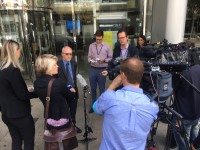New report into Western Power sell-off fails to tell full story
Wednesday 26 Oct 2016A new PwC report released today has blatantly omitted key facts, while arguing the case for privatising Western Australia’s electricity networks.
The PwC Energy Paper, launched at a Chamber of Commerce and Industry WA breakfast where Energy Minister Mike Nahan presented arguments for privatising Western Power, failed to address the massive job losses, increased power prices and huge dividend payments made to the Barnett Government.
Electrical Trades Union WA Branch Secretary Les McLaughlan, who attended the event, said the PwC report, entitled The case for change: privatisation of Western Australia’s electricity networks, was “one-sided propaganda”.
“Dr Nahan told today’s breakfast that PwC had produced this report without payment from the State Government,” Mr McLaughlan said.
“Given the enthusiasm PwC has expressed for privatising Western Power, one wonders whether this is really about positioning their business for the millions of dollars in consultancy fees that would flow in managing the privatisation process.
“Bizarrely, PwC spends a substantial part of its report providing political advice to the State Government on how they can convince the community that privatisation is a good thing. This is not surprising, given PwC has previously advised governments on privatisation in other Australian states.
“With a strong commercial interest in privatisation, it is not surprising that PwC has selectively chosen statistics and case studies to support their case.
“In its report, PwC does not mention the fact that the Australian states with the highest power bills are in fact the states where there has been a complete privatisation of poles and wires. In Victoria and South Australia, households pay hundreds of dollars more each year for their power, a point which was conceded this week by Dr Nahan.
“The PwC report also neglects to mention that faulty privatised power lines were found to have caused five of the worst Victorian Black Saturday bushfires in 2009, and that underinvestment in the networks and preventative maintenance were key factors.”
Mr McLaughlan said more than 170 people died on Black Saturday and the private power companies had paid damages of $734 million to the victims.
“Alarmingly, the very regulator Dr Nahan wants to take over regulation of the WA energy market, the Australian Energy Regulator, gave permission to the private owners of the poles and wires to pass on the cost of these damages to the community through higher power prices,” he said.
“In its report, PwC also fails to mention that 500 jobs, of which many are maintenance jobs, are currently being axed as Western Power cuts costs in preparation for the sell-off. It also does not mention that the number of new apprentices employed by Western Power has plummeted from more than 50 two years ago to zero this year.
“Further, while the PwC report talks a lot about the debt that could be retired in the short-term if Western Power is privatised, it made no mention of the $401 million dividend Western Power paid the State Government last year, which was used to fund services like health and education.
“Privatisation may benefit the big end of town, including firms like PwC, but the community is quite rightly concerned about power prices, jobs losses, cuts to maintenance and forgone revenue.”
Community members and unions who have joined the Use Your Power campaign against the privatisation of the Government’s publicly owned asset will stage a public rally on November 15.
Use Your Power has campaigned heavily since 2014, raising awareness that the privatisation of Western Power would result in bigger power bills, fewer jobs and apprenticeships and cuts to preventative maintenance. This would mean longer waits to fix faults and an increased risk of bushfire.

